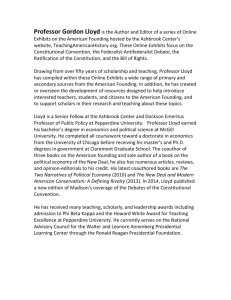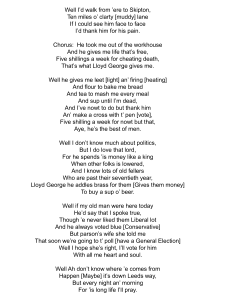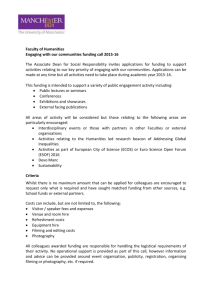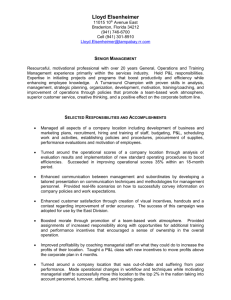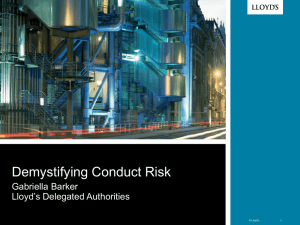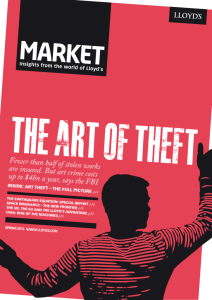THE ROLE OF INSURANCE IN SOCIETY
advertisement
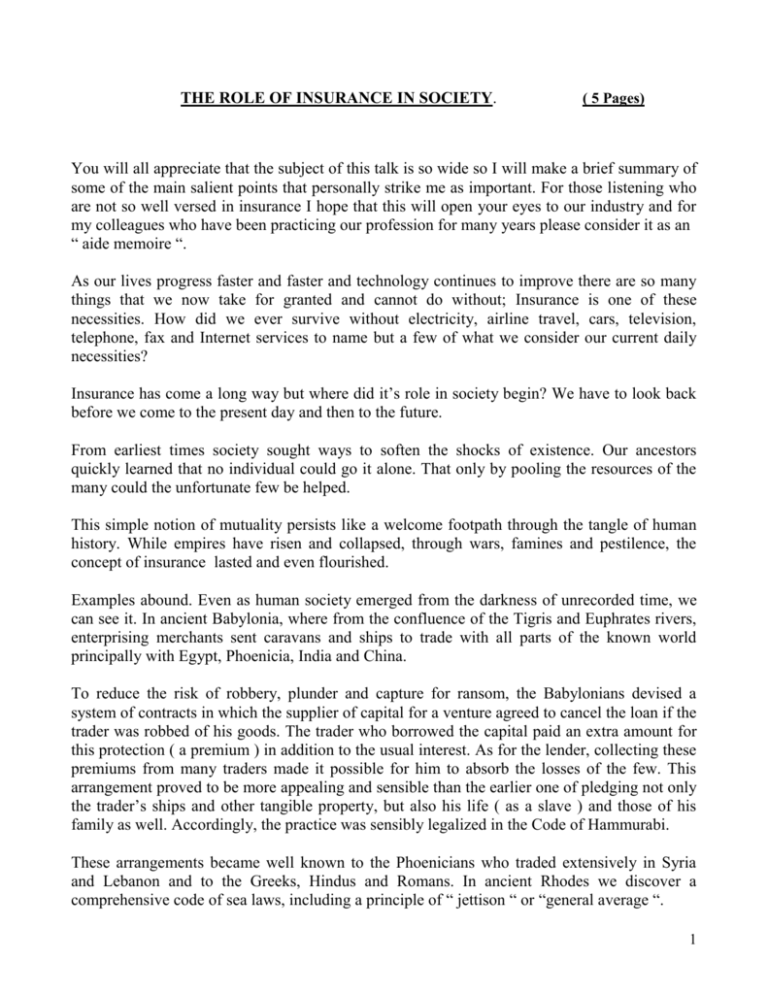
THE ROLE OF INSURANCE IN SOCIETY. ( 5 Pages) You will all appreciate that the subject of this talk is so wide so I will make a brief summary of some of the main salient points that personally strike me as important. For those listening who are not so well versed in insurance I hope that this will open your eyes to our industry and for my colleagues who have been practicing our profession for many years please consider it as an “ aide memoire “. As our lives progress faster and faster and technology continues to improve there are so many things that we now take for granted and cannot do without; Insurance is one of these necessities. How did we ever survive without electricity, airline travel, cars, television, telephone, fax and Internet services to name but a few of what we consider our current daily necessities? Insurance has come a long way but where did it’s role in society begin? We have to look back before we come to the present day and then to the future. From earliest times society sought ways to soften the shocks of existence. Our ancestors quickly learned that no individual could go it alone. That only by pooling the resources of the many could the unfortunate few be helped. This simple notion of mutuality persists like a welcome footpath through the tangle of human history. While empires have risen and collapsed, through wars, famines and pestilence, the concept of insurance lasted and even flourished. Examples abound. Even as human society emerged from the darkness of unrecorded time, we can see it. In ancient Babylonia, where from the confluence of the Tigris and Euphrates rivers, enterprising merchants sent caravans and ships to trade with all parts of the known world principally with Egypt, Phoenicia, India and China. To reduce the risk of robbery, plunder and capture for ransom, the Babylonians devised a system of contracts in which the supplier of capital for a venture agreed to cancel the loan if the trader was robbed of his goods. The trader who borrowed the capital paid an extra amount for this protection ( a premium ) in addition to the usual interest. As for the lender, collecting these premiums from many traders made it possible for him to absorb the losses of the few. This arrangement proved to be more appealing and sensible than the earlier one of pledging not only the trader’s ships and other tangible property, but also his life ( as a slave ) and those of his family as well. Accordingly, the practice was sensibly legalized in the Code of Hammurabi. These arrangements became well known to the Phoenicians who traded extensively in Syria and Lebanon and to the Greeks, Hindus and Romans. In ancient Rhodes we discover a comprehensive code of sea laws, including a principle of “ jettison “ or “general average “. 1 The principle of sharing losses becomes more clearly defined as we trace the origins of life and health insurance in the ancient practices of Greece and Rome. We see, for example, people joining together in burial societies that paid funeral costs out of monthly dues. Although these associations or guilds began as purely religious groups, they gradually became broader in scope as the benefits of the sharing principle became steadily more apparent. Health and burial insurance evolved extensively under a mutual plan without profit considerations in the Anglo-Saxon and German guilds of the middle ages. As successors to their Greek and Roman counterparts, the guilds combined the characteristics of trader associations, unions and fraternal societies. To the Italian city republics of Venice, Pisa, Florence and Genoa, we can track the practice of insurance on a “ premium “ basis to about 1250 A.D. and in the Barcelona of 1435 A.D. we find the first comprehensive code of insurance laws. Our earliest record of true life insurance with “insurable interest“ dates back to 1430 in Genoa and, among other things, had to do with the lives of pregnant wives. With the decline of medieval life and the guilds, so called “ friendly societies “ assumed the functions of mutual protection. Typically, these “ societies “ were made up of local groups of working people who made regular weekly or semiweekly contributions into a common fund administered by elected officers. In 1666 the Great Fire of London finally and forcibly demonstrated the need for fire insurance. The primitive fire-fighting methods of the day were virtually helpless against the hungry flames which roared unchecked through narrow streets reducing timbered dwellings to ashes. The Great Fire of London burned for four days and nights. It razed 436 acres, devouring 13,200 houses, 89 churches ( including Saint Paul’s Cathedral), the Custom House, The Royal Exchange and dozens of other public buildings. Only six people perished in the flames, but hundreds died from shock and exposure. Not surprisingly, the effects of the Great Fire were galvanizing to a stunned population. Insurance protection as we know it today can be traced to the aftermath of that tragedy and to a man called Nicholas Barbon. Profoundly shaken by the Great Fire, Barbon promptly opened an office “ to insure buildings “. This venture was apparently successful, because in 1680 he founded a partnership and established England’s first fire insurance company, the Fire Office, to insure brick and frame houses. The second company to be formed, the Friendly Society, was organized in 1683 incorporating some mutual characteristics. Policyholders had to agree to contribute toward settlement of each loss incurred, although the founders retained a predominant interest in the profits. 2 Many other companies were subsequently established. In this same period seafarers flocked to Edward Lloyd’s coffeehouse in Tower Street, near the Thames waterfront in London, to gossip, play cards, and conduct business, and Edward Lloyd serviced their needs. Coffee, valued for its therapeutic powers, was a penny a cup. Pens, ink and paper were free, as was news, provided by Lloyd’s runners who scurried back and forth between the coffeehouse and the docks, gathering the latest information on the comings and goings of ships and their cargoes. In the days of sail and rudimentary navigation, the news was often bad; ships were wrecked and merchants ruined. It was at Lloyds coffeehouse that modern Marine Insurance was born. Although risky, the business was lucrative, and it attracted investors who formed groups or “syndicates“ to back underwriters. On the side, opportunists took bets not only on whether a ship would arrive safely but on contingencies as varied as whether a candidate for Parliament would be elected and when a sick person would die. Corruption flourished. By 1771 larceny and wagering threatened to overwhelm legitimate business. That year, 79 of the soberer underwriters broke away and established a formal association in a building nearby. Though Edward Lloyd was long dead, his name stuck, as did the tradition of doing business from wooden benches clustered in rectangular “ boxes “ around a large room. Lloyd’s came of age insuring ships during a succession of wars culminating in the defeat of Napoleon at Waterloo in 1815. War drove premiums up. Many ships were sunk and much money was lost, but the skilled underwriters got rich, and Lloyd’s grew in size and importance. By the 19th century, its runners had become a worldwide network of intelligence agents, utilized not only by Lloyd’s for ship monitoring but the British government for a range of economic and military intelligence – a phenomenon that fed Lloyd’s reputation for mystery and secrecy. In 1906 a signal event came to Lloyd’s- the San Francisco earthquake. Cuthbert Evan Heath, a leading broker and underwriter, telegraphed instructions to his California representative to immediately pay all claims to Lloyd’s customers in full, whatever the terms of their policies. Heath’s dramatic gesture, at a time when U.S. Insurers were squeezing and underpaying the quake victims, emblazoned Lloyd’s in the pantheon of world finance as an emblem of trust. While still insuring much of world shipping, Lloyd’s by then also offered coverage for property and casualty, fire and theft, and product liability. It was known for accepting large and complex risks that no one else would touch. By granting or withholding insurance, Lloyd’s could made or break a risky new business venture. Lloyd’s earned for the British balance of payments nearly as much as the entire British banking system. It was the largest private investor in the U.S. government, holding billions of dollars in Treasury bonds. It was also a cultural force in society indeed the Art collection of one Lloyd’s official became the nucleus of the National Gallery in London. 3 So returning to the present where does that leave us? To repeat Insurance today plays a vital role in the economy of any country and world trade. Insurers can make or break new investments or stop existing businesses from expanding as if they decline to insure then Banks will refuse the necessary loans. Most businesses have to rely on Bank finance for their development and Banks oblige them to insure their exposures. Insurers allow communities to recover from the disastrous financial consequences of natural catastrophes ( Earthquakes, Tsunamis, Tropical Storms) or human related events ( September 11th 2001 being the most recent memorable event). Insurers also play a social role in society by sponsoring sporting events, educational programmes and youth-orientated schemes to name but a few of the philanthropic contributions Insurers make to society. If we take a modern country such as Canada we find that major Canadian companies and financial Institutions derive more than 25 percent of their debt financing needs from Life and Health Insurance Companies. This source of long term capital is crucial to a vibrant and growing economy. On top of this by helping to protect individuals, their families and their businesses against the financial risks of death, illness and retirement with financial security products the insurance industry complements and supplements the public sector social security systems. Turning to my home country the UK Insurance Industry employs more than 350,000 persons which is a third of all financial services jobs and accounts for almost 20 percent of investments in the stock market as well as being a major invisible trade earner. So you see insurance is also a vehicle for job creation and a way to reduce unemployment in society particularly as half of these jobs are for support roles such as secretarial, word processing, bookkeeping and similar clerical tasks. However with technology and software advances certain jobs in the insurance industry will diminish e.g. the use of underwriting software that automatically analyses and rates insurance applications will limit the employment growth of underwriters. At this stage let’s go back to the beginning of this speech. Current day’s problems and what does the future hold. If anyone knows the latter he’ll become a rich man! However as far as people are concerned it’s clear that we are living much longer. With the advent of the “ graying society “ the number of those requiring nursing care is certain to grow sharply. In the past, care for senior citizens was marked by the relatively low numbers of those who required it, and was also generally a short-term matter. However, with the lengthening of the average life span, nursing care will no longer be the exception to the rule, and will also unavoidably become a long-term affair. More people will need to buy health and long-term care insurance as well as annuities and other types of pension products. Perhaps Insurers should find a role in society advising on such matters as health education including nutrition and dental hygiene as well as lending more support to public health projects and medical research. 4 In closing I would mention just a few of the lesser known types of insurance which perform a pivotal role in society. Without these insurances many professions and businesses would not be able to operate or we would only have them in a reduced format. (i) Professional Indemnity - for Architects, Consulting Engineers, Land Surveyors, Town Planners, Management Consultants, Lawyers, Stockbrokers, even for Insurance Brokers. (ii) Medical Malpractice – for Doctors and Surgeons. (iii) Kidnap and Ransom Insurance. (iv) Livestock and Bloodstock Insurance including fish farms. (v) Contingency covers for adverse weather, non-appearance of entertainers, protecting promoters costs and expenses. (vi) Film production including cover for the eventual sales not reaching the cost of production budgets. (vii) Over redemption. (viii) Space exploration. (ix) Political Risks Insurance including Confiscation, Nationalisation, Seizure, Non-honouring of Government Guarantees, Terrorism, War, Currency Inconvertibility. (x) Export Credit Guarantee Covers, Contract Frustation Indemnity for Exporters and Unfair Calling of Bank Guarantees. (xi) Malicious Contamination, Product Recall and Product Guarantee Covers. (xii) Environmental Insurance against pollution and associated clean-up costs. This list is endless and will continue to grow as technology and inventions expand. To coin a phrase “ in life only two things are sure death and taxes “, insurance can also safeguard you against the consequences of both of these. John Barrett 5
